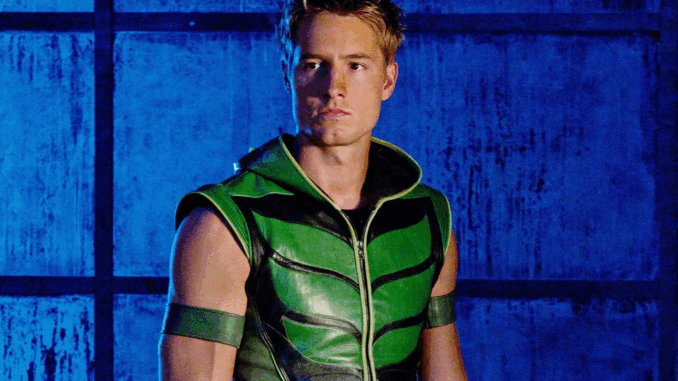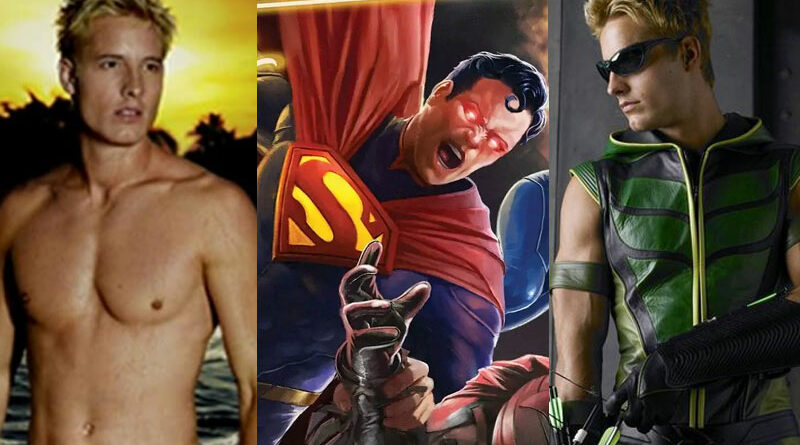
Early Roles in Genre Television
Before Justin Hartley became a household name with deeply emotional roles in This Is Us and Tracker, he first gained recognition as a staple in the world of genre television—particularly in superhero dramas. These early roles showcased Hartley’s physicality, charisma, and growing talent for portraying layered, conflicted heroes. They also laid the foundation for a career built on emotional storytelling, moral nuance, and a commitment to meaningful character work.
Hartley’s entrance into the superhero genre came during a period when television was beginning to embrace comic book stories in a more serious, character-driven way. In that environment, his work proved pivotal in legitimizing superhero roles as spaces for emotional depth and narrative complexity.
A Defining Turn as Oliver Queen in Smallville
In 2006, Hartley was cast as Oliver Queen, also known as Green Arrow, in The CW’s Smallville, a series that had already redefined Superman’s mythology for a younger audience. Hartley’s Oliver Queen was initially a guest star, but the strength of his performance and the positive fan response soon earned him a permanent place in the ensemble.
Unlike the light-hearted or invincible portrayals of superheroes common at the time, Hartley’s Green Arrow was a morally conflicted vigilante who struggled with isolation, trauma, and self-doubt. His Oliver Queen brought emotional layers to a genre previously dominated by spectacle. Through arcs involving betrayal, lost love, and questions of justice, Hartley infused the character with humanity, vulnerability, and even existential dread.
Fans and critics alike praised his ability to ground the character, turning Green Arrow into more than just a supporting role—he became a moral counterweight to Tom Welling’s Clark Kent. The dynamic between Clark and Oliver provided an avenue for complex questions about the nature of heroism, authority, and responsibility.
The Lost Aquaman Pilot: A Glimpse at an Alternate Career Path

In 2006, just before joining Smallville, Hartley had filmed the pilot for a standalone CW series called Aquaman (also known as Mercy Reef). He portrayed Arthur Curry, a brooding, determined young man learning to harness his powers in the ocean depths while unraveling secrets about his past.
Although the pilot was never picked up by the network, it remains a fascinating glimpse into a road not taken. Hartley’s performance showed early signs of his ability to balance genre material with emotional gravity. The show was ambitious, moody, and ahead of its time, and its cancellation had little to do with Hartley’s capability.
Years later, fans still seek out the unaired pilot online as a kind of cult artifact, wondering what might have been had the series gone forward. Hartley himself has spoken fondly of the experience, citing it as a turning point in his understanding of what it meant to lead a series.
Superhero Work as Emotional Training Ground
Though superhero roles are often dismissed as simplistic or superficial, Hartley has argued that they require a unique emotional and physical stamina. “You have to believe in the stakes, no matter how fantastical,” he said in a retrospective interview. “And that means grounding yourself in real emotions, even when the plot is surreal.”
Whether fighting villains, confronting personal demons, or navigating love interests with secret identities, Hartley consistently brought dramatic authenticity to roles that could easily have become clichés. His time in superhero television helped him refine his ability to communicate silent grief, conflicted loyalty, and internal rage—traits that later defined his dramatic work.
Post-Superhero Evolution and Lasting Influence
After leaving Smallville, Hartley continued to explore genre work but gradually transitioned into more grounded dramas. However, the legacy of his superhero work has followed him. He’s often credited with bringing a new level of emotional realism to costumed characters, and his version of Green Arrow helped pave the way for future portrayals—including the darker, grittier take seen in the later CW series Arrow.
Today, Hartley reflects on his superhero years with gratitude. “They weren’t just stunts and suits,” he once said. “They were stories about how hard it is to do the right thing. That’s always going to be powerful.”
For fans who first discovered Justin Hartley in green leather and a bow, his evolution into one of television’s most emotionally articulate actors may feel like a transformation—but for Hartley, it’s always been the same mission: to tell the truth of a character, no matter the genre.
